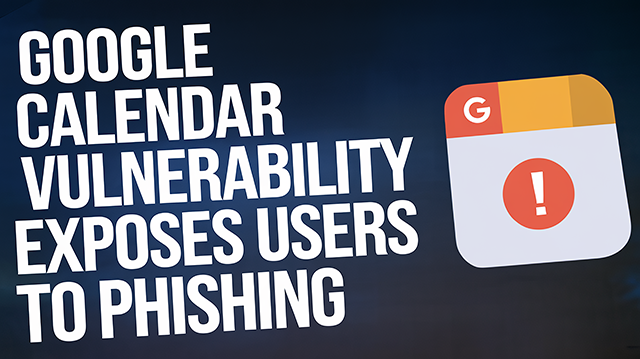Google Calendar Vulnerability Exposes Users to Phishing

Threat Group: - Unknown Threat Actors
Threat Type: - Phishing/Malware Distribution
Exploited Vulnerabilities: - Social engineering via calendar invitations
Malware Used: - Various malware strains delivered through phishing links
Threat Score: - Medium (7.2/10) – Exploits user trust in a widely used platform and bypasses traditional email security.
Last Threat Observation: - February 19, 2025
Overview
Cybersecurity researchers have uncovered a new phishing campaign targeting users via unsolicited Google Calendar notifications. This attack abuses a feature in Google Calendar that automatically adds invitations to a user’s calendar, even if the user has not accepted them. This vulnerability allows attackers to bypass traditional email security measures, delivering malicious links directly into users’ calendars. The tactic is particularly dangerous because it exploits the trust users have in their calendar applications, leading them to believe the notifications are legitimate.
Google Calendar’s automatic event addition is at the heart of this issue. Invitations containing malicious links appear in users’ calendars without their explicit approval. These links often direct victims to phishing websites that mimic legitimate sites—such as cryptocurrency exchanges, tech support portals, or corporate login pages—to harvest credentials, credit card details, and other sensitive information. By exploiting the default Google Calendar settings, attackers have found a simple yet highly effective way to bypass conventional email filtering and traditional spam defenses.
Key Details
Delivery Method:
- Unsolicited calendar invitations with links to phishing sites or malicious calendar (.ics) files.
- Phishing emails appear to be legitimate Google Calendar invitations, passing DKIM, SPF, and DMARC checks.
- Events with malicious links are automatically added to users’ calendars, generating reminders that encourage interaction.
Target:
- Wide-ranging victims, including individual users, educational institutions, healthcare organizations, construction companies, and financial institutions.
- With over 500 million users globally, Google Calendar presents a vast attack surface.
Functions:
- Automatic Event Addition:
- Default calendar settings add invitations automatically, enabling attackers to bypass user approval.
- Social Engineering:
- Events appear legitimate, often including well-known brand names or services.
- Credential Harvesting and Malware Delivery:
- Links redirect victims to phishing pages that mimic trusted sites.
- Security Evasion:
- Phishing emails appear legitimate, often passing standard email security checks.
- Embedded Malicious Content:
- Attackers use .ics files, Google Forms, and Drawings to embed malware or direct victims to phishing pages.
Obfuscation:
- Malicious links are often masked as reCAPTCHAs, support buttons, or other seemingly benign elements.
- URLs may use domains or certificates that appear trustworthy, further reducing suspicion.
Attack Vectors
This phishing tactic takes advantage of a widely trusted productivity tool. Attackers exploit Google Calendar’s automatic event addition feature to push unsolicited invitations containing harmful links. These invites appear as normal calendar entries and notifications, making them seem legitimate and bypassing traditional email filters. Victims who click the embedded links are directed to phishing websites that request sensitive credentials or install malware. This combination of exploiting user trust and leveraging default settings creates a highly effective attack vector.
Mitigation and Prevention
Adjust Calendar Settings:
- Disable automatic addition of events.
- In Google Calendar:
- Go to Settings.
- Under “Event Settings,” set “Automatically add invitations” to “No, only show invitations to which I have responded.”
- Uncheck “Show declined events” to avoid viewing unwanted invitations.
- Use the “known senders” setting to filter invites from unknown sources.
User Education and Awareness:
- Inform users about the risk of unsolicited calendar invites.
- Encourage users to verify the sender before interacting with calendar events.
Security Software and Monitoring:
- Keep antivirus and anti-malware solutions updated.
- Regularly scan for malicious .ics files and suspicious calendar activity.
- Monitor logs and email activity for unusual patterns or unexpected calendar entries.
Two-Factor Authentication (2FA):
- Enable 2FA on Google accounts to add an extra layer of protection against credential theft.
- Even if credentials are stolen, 2FA can help prevent unauthorized account access.
Stay Updated:
- Ensure all software and browsers are up to date with the latest security patches.
- Apply any security enhancements offered by Google to reduce the likelihood of calendar abuse.
Motives Behind the Attacks
The primary motive behind these attacks appears to be financial. By tricking users into providing credentials or payment information, attackers can commit fraud, identity theft, or sell stolen data on the dark web. The scale of Google Calendar’s user base makes it an appealing target for threat actors looking to maximize their reach and profits. Beyond financial gain, attackers may also use these campaigns to deliver malware that grants further access to victims’ devices, enabling long-term exploitation.
Threat Actors
While specific groups have not been publicly attributed, the nature of these attacks suggests that organized cybercriminal groups are leading these efforts. The use of well-crafted phishing pages, passing email security checks, and widespread targeting indicates a level of sophistication often associated with established threat actors. Individual hackers may also replicate these techniques, given the relative ease of abusing Google Calendar’s invitation features.
Conclusion
Google Calendar’s convenience and widespread adoption have made it a tempting vector for cybercriminals. By leveraging automatic event additions, attackers can seamlessly bypass traditional security measures, exploit user trust, and deliver phishing links directly into users’ calendars. Although Google has introduced enhanced settings and security measures, users must take proactive steps—adjusting calendar settings, remaining vigilant, and adopting multi-layered security defenses—to mitigate these ongoing threats. It is essential for both individuals and organizations to understand the risks and implement the recommended protections to safeguard their accounts and sensitive data.
Sources:
Scammers Use Google Calendar to Distribute Fraudulent Notifications - NODAL
Ongoing phishing attack abuses Google Calendar to bypass spam filters - BleepingComputer
Phishing Attacks Take Advantage of Automatic Google Calendar Events - TitanHQ


